I'm attempting to use a genetic algorithm to arrange a random list of seats for a given section in a classroom so that all the groups in that classroom sit together.
Here is my current attempt, I'm unclear about the best way to improve this algorithm as this is very very early days in my GA learnings.
I'm using the Java library Jenetics, which has been pretty awesome at getting me started, here is the Engine.
final Engine<EnumGene<Seat>, Double> ENGINE = Engine
.builder(SeatingFitness::fitness, encoding)
.populationSize(200)
.selector(new RouletteWheelSelector<>())
.alterers(
new PartiallyMatchedCrossover<>(0.2),
new Mutator<>(0.01)
)
.optimize(Optimize.MINIMUM)
.build();
The encoding looks like this
static final ISeq<Seat> seats = ISeq.of(createSeats());
static final Codec<ISeq<Seat>, EnumGene<Seat>> encoding = Codecs.ofPermutation(seats);
public static List<Seat> createSeats() {
return new ArrayList<>(Arrays.asList(
new Seat("Group C", 1),
new Seat("Group A", 2),
new Seat("Group B", 3)
.....more seats here....)
}
My fitness function can be improved for sure, I'm not using any libraries, so any suggestions here would be great, but it looks like this.
Essentially what I'm doing is just finding the x and y coordinates of each seat in the group and calculating how far each one is from the others in the group, and summing those values up. The lower value the better, hence the Optimize.MINIMUM in the Engine
private static int numberOfSeatsInRow = 8;
public static double fitness(final ISeq<Seat> seats) {
AtomicDouble score = new AtomicDouble();
// Group together all the seats that belong to a particular group.
Map<String, List<Seat>> grouping = seats.stream().collect(groupingBy(Seat::getGroup));
grouping.forEach((group, groupsSeats) -> {
// Find the location in the overall list of the seats for the group.
if (!group.equals(Seat.EMPTY_SEAT)) {
List<Integer> indexOfSeatInOverallList = groupsSeats.stream().map(seats::indexOf).collect(Collectors.toList());
if (indexOfSeatInOverallList.size() > 2) {
// Get the first element positioned correctly on the x and y axis
double totalCalculated = indexOfSeatInOverallList.stream().reduce(0, (subTotal, currentElement) -> {
int xReferenceCoordinate = calculateXCoordinate(currentElement);
int yReferenceCoordinate = calculateYCoordinate(currentElement);
double totalDistance = 0;
int multiplier = groupsSeats.size() <= numberOfSeatsInRow ? 10 : 500;
for (Integer integer : indexOfSeatInOverallList) {
int xSecondary = calculateXCoordinate(integer);
int ySecondary = calculateYCoordinate(integer);
if (ySecondary != yReferenceCoordinate) {
totalDistance += multiplier * Math.abs(yReferenceCoordinate - ySecondary);
}
totalDistance += calculateDistanceBetweenTwoPoints(xReferenceCoordinate, yReferenceCoordinate, xSecondary, ySecondary);
}
return (int) totalDistance;
});
score.getAndAdd(totalCalculated);
}
}
});
return score.get();
}
private static int calculateXCoordinate(int positionInList) {
int xPosition = positionInList % numberOfSeatsInRow;
if (xPosition == 0) {
xPosition = numberOfSeatsInRow;
}
return xPosition;
}
private static int calculateYCoordinate(int positionInList) {
int xPosition = positionInList % numberOfSeatsInRow;
int yPosition = positionInList / numberOfSeatsInRow;
if (xPosition == 0) {
yPosition = yPosition - 1;
}
return yPosition + 1;
}
private static double calculateDistanceBetweenTwoPoints(int x1, int y1, int x2, int y2) {
// https://dqydj.com/2d-distance-calculator/
double xValue = Math.pow((x2 - x1), 2);
double yValue = Math.pow((y2 - y1), 2);
return Math.sqrt(xValue + yValue);
}
See the results image below, as you can see it's pretty good (although it takes about 3 minutes to run to produce a proper result).
